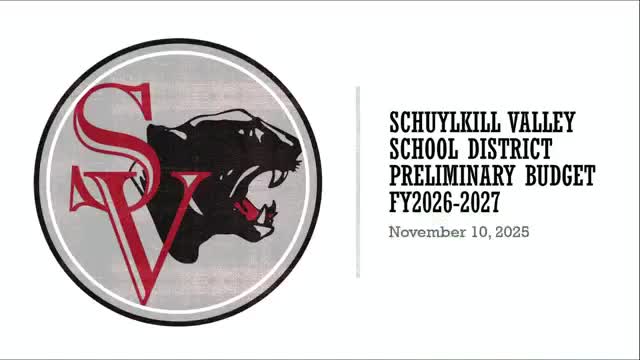Preliminary 2026-27 budget shows small deficit as charter and special-ed costs rise
Get AI-powered insights, summaries, and transcripts
Subscribe
Summary
District finance staff presented a preliminary 2026-27 budget projecting $50.8M in revenue and $51.0M in expenditures — a roughly $200,000 shortfall — driven by rising charter-school tuition and special-program costs; board members urged caution about relying on temporary wage savings from unfilled positions.
Schuylkill Valley School District's finance staff on Oct. 27 presented a preliminary 2026-27 budget that shows revenues of roughly $50.8 million against expenditures of about $51.0 million, producing an early gap of about $200,000.
Kristen, the district's finance presenter, told the board the budget is preliminary and subject to change but highlighted key assumptions: no tax increase (millage held at 27.82), a 1.5% increase in assessed values for 2026-27, a 98% tax-collection assumption and approximately 70% of revenues coming from local taxes with about 26% from the state. The presentation assumed $4–$500,000 in interest income and roughly $400,000 in federal funding, and included a 1% budgetary reserve (about $500,000).
Kristen and the auditor had earlier told the board that the district ended FY24-25 with an unassigned general fund balance of roughly $2.5 million (about 5.1% of next year's budgeted expenditures). The preliminary budget factors in a $1.2 million increase in total expenditures over the prior year, driven largely by salary and benefit increases (about $850,000), a roughly $350,000 rise in charter-school costs and higher special-program and contracted services costs.
Board members pressed for detail on a $1,470,000 special-programs overage reported in the audit presentation; Kristen said the largest contributors were out-of-district placements and contracted speech-therapy services. Members also noted that a reported $713,000 wage underrun in the prior year resulted from unfilled positions, and cautioned that those savings should not be relied on for recurring budget balancing once vacancies are filled.
Kristen flagged state-level uncertainty: lawmakers had not enacted a state budget as of the presentation, leaving districts nationwide waiting on an estimated $5.3 billion in delayed payments; she also explained aspects of the basic education funding (BEF) formula that reduce the district's share relative to state medians because of higher local median household income and local effort indices.
The board and finance staff said they will continue refining assumptions through the winter, consider management-letter recommendations from the audit (including fund-balance policy), and return with updated projections as contract negotiations and state actions become clearer.
